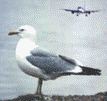Bird Strike Committee Proceedings

Bird Strike Committee-USA/Canada Joint Annual Meeting: 8th (2006)
Date of this Version
8-12-2006
Document Type
Article
Abstract
Nicarbazin (NCZ) is an anticoccidial drug routinely used in the poultry industry. When fed to laying hens, NCZ impacts reproduction by either reducing hatchability of eggs or reducing rate of egg laying. Initial laboratory tests were conducted with mallards (Anas platyrhynchos) to determine the efficacy of NCZ as a waterfowl contraceptive. Hatchability was 26% for mallards fed 34 mg NCZ/kg body weight (500 ppm in feed) for 14 days compared to 55% for control mallards. Based on these results, two field studies, one each in Oregon and Colorado, were conducted with Canada geese (Branta canadensis), which showed a 50-56% decrease in hatchability when OvoControl G was fed during the breeding season. In November 2004, OvoControl G (2500 ppm) was registered with the Environmental Protection Agency as a reproductive inhibitor for resident Canada geese. In 2005-2006, a nesting study with 11 pairs of captive pigeons (Columba livia) evaluated the effectiveness of OvoControl P (5000 ppm NCZ) in reducing egg hatchability. During the pre-treatment phase, birds had unlimited access to normal maintenance diet and each female produced 2 eggs, all of which hatched and developed normally. The number of eggs produced during the treatment phase, when birds had daily access to OvoControl bait, did not differ from the number of eggs produced during the pre-treatment phase, but the number of nestlings decreased 59% to 9 chicks. Furthermore, 91% of the pairs experienced reduced egg hatchability. Productivity in the recovery phase returned close to pretreatment levels as 21 eggs were laid and 18 viable nestlings were produced. These findings demonstrate that OvoControl can reduce pigeon productivity and that pigeons will return to normal following withdrawal of OvoControl. The effect of OvoControl is dependent on the daily consumption of treated bait. Therefore, field application must ensure consistent daily exposure to the target population.

